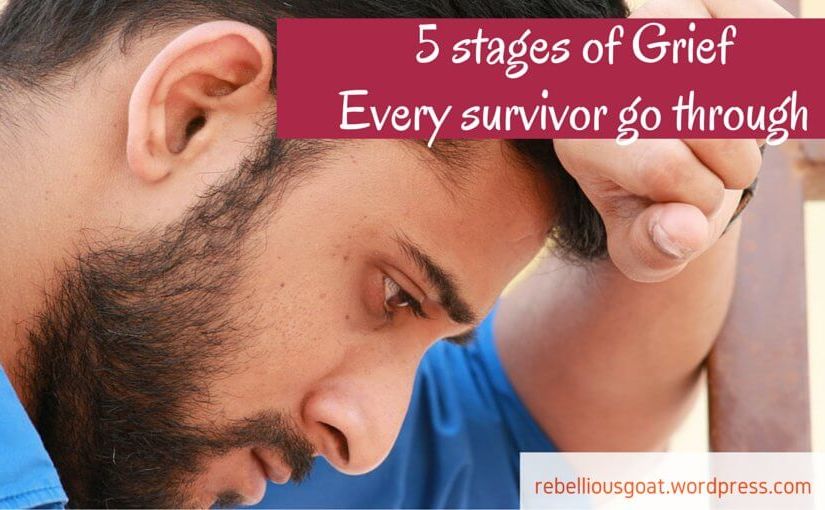Strength shows not only in the ability to persist, but to start over.
Probably many people heard of “5 stages of grief” after the loss of loved-ones or divorce etc. According to my personal experience, abused survivors also going through similar healing / grieving process. It’s not necessary have specific order or time limit for each stage as it depends on individuals’ perception / experiences : some may stuck at certain stage much longer than other stages; jump around or wandering back and forth.
Denial
Human born to have coping mechanism to protect ourselves and eliminate pains / hurts while handling disasters/trauma. But this habit may sometimes obstruct our objective thinking. For example, when we are confronted by difficult situation we tend to deny the facts.
It’s common to find wives who deny all evidences indicated from their husband’s affairs, they reject to accept the truth that the so-called good marriage actually ended long time ago; someone who has anger issues reject to see the deep-rooted childhood abused issues.
It’s so scary to admit and dealing with truths so people usually chose to ignore problems. During this stage, victims feel numb, confused and avoid any hints / signals that obviously seen. Wives who were betrayed make excuses to rationalize their husbands’ disloyal attitudes in smoothing overwhelming emotions.
Survivors who was abused in childhood may may block out conversations whenever people bring up childhood topics. I knew it because I was one of them, even until today I still not 100% comfortable to share my childhood stories. I have chatted with several abused survivors who were raised by toxic / abusive parents, but explained their situations in a oddly calm tone, acted like there’s nothing bad happened to them, or tried very hard to glorify the whole experience.
Victims may isolated, withdraw from friends and society in avoiding reality. Unfortunately, the more we deny, the longer we delay the healing process.
It took me years to overcome my fears, shame and finally willing to open my heart and eyes to explore more about my situation. I used to act like a ostrich, who bury my head to the sand.
Anger
When victims were confronted to face the facts, usually not only ignore and deny, but also the most common initial emotion that emerged is anger.
I used to misunderstood this emotion but now realize “anger” is just a mask of many hidden emotions, e.g. fear, shame, frustration, anxiety, worry, etc. Very often, when people were embarrassed, their uncontrollable anger will be burst out irrationally. Obviously, it’s much easy to put the blame to others than unmasking / dealing the truth.
People can feel angry and throw temper to their friends, loved-ones, outsiders : common TV episodes showed family members yell, scream to doctors / nurses who were failed to heal their significant others / loved ones; when a friend point out how abusive their partner are, or disclose their partners’ cheating behaviors, etc. wives / husbands will get angry towards these supporting friends for judging their personal lives.
In some other cases, victims can get angry on their own selves for making stupid mistakes and decisions, e.g picked the wrong person to marry. I experienced an extreme angry phrase years ago, though I seldom project my anger to others but tend to bury all these frustration inward. There’s no suitable words can be used to describe my feelings, it’s just like a huge fire burning inside and there’s nothing I can do to calm it down. I was so furious for myself for being naive, listen to abuser’s comments and orders; angry at myself for not able to be brave, speak out and stand up for myself.
Bargaining
At this stage, victims try to resolve and control the situation, which is clarified as the weakest stage by many professionals. It’s because people who reach this status are willing to do everything in order to postpone, amend any mistakes that made, or change the situation.
For example, many people may spend huge amount of money on different alternative treatments after they were diagnosed from serious illness. A wife who is suffering from domestic violence / narcissistic abused may seek out spiritual healers, have new superstitious belief about their past-lives, current relationships etc.
Victims will try to make a deal or promise, do anything to take away those pains and problems. They are hungry for information, jump around asking for helps / advice from their friends / family, e.g. buy expensive clothes / cosmetics in order to attract their men back. “Please tell me what to do and I will do anything” is a sign for people at this stage, they willing to compromise and make any changes to make things happen.
When I look back to my life, there’s time I was SO hungry for any information / knowledge I can be found. Now I understand I was in panic mode, trying my every effort to dig out the ultimate solution which can lift me up to the ground from the bottom. I was crazy and spent hours and hours to join numerous courses, books and seminars. I’m still eager to learn all healing techniques but now is more reasonable and time manageable. Absorb information more wisely.
Depression
Victims at this stage feeling hopeless, helplessness, vulnerable, unmotivated and there seem nothing can be done to fix the problems. This is the time people give up, depressed or easily indulged in destructive behaviors / habits, e.g. substance abuse, eating disorder or gambling, etc.
Some may upset for wasting such a lot of time on a wrong person; depressed for wasting so much money buying luxury things for their loved-one, shamed for not speaking up about their sexual abused stories by relatives / family members.
I picked up binge-eating to smooth my emotions / anger and frustration. I thought I never have depression but now with a more clear mentality, noticed that I was actually suffered from PTSD and depression for years, though symptoms were not severe because I mainly eat for my emotions. This is definitely not a good coping mechanism but at least it distract me from touching another destructive behavior. When things go right, I was doing OK, but when flashbacks and emotions dived in, my daily life can be collapsed completely for days, weeks or even months.
Acceptance
After going through all denial, mourning moments, survivors will reach the stage accept facts. They started to face the situation bravely and listen to others’ comments / suggestions.
A female / male who was finally accepted they were actually betrayed by partners will start to search for professional help, e.g. marriage counselling, or accept the reality of such relationship already ended so they move on. An abused survivor start to accept what actually happened in the past and will strive to heal from abusive experience, e.g. start to eat healthy, exercise or get rid of destructive behaviors. They explore new plans and options to start a new chapter of life.
Closing thoughts
According to my own experience, anyone who go through any kinds of traumatic events should cut themselves some slacks. Healing and coping loss is a very unique / personal experience. Outsiders can never fully understand what you been through and doubt about your emotions reactions to certain things.
Please allow yourself to grieve naturally according to your own tempo. Cry, yell and depressed when you need, but just make sure you get back to the horse with more strength and wisdom.
Photo credit : Pixabay – techzia


This is very insightful. I think we are all familiar with stages of grief compared to death but not so much compared to abuse. It helps explain those actual feelings of grief so they can be understood.
LikeLiked by 2 people
Yes, i know how it feels as a survivor. Many people just don’t understand what we are going through so I attempt to make it clear by sharing.
LikeLiked by 2 people
Speaking the truth, sharing helps us and others. Keep writing.
LikeLiked by 1 person
You too. I want to see more about your sharing so can learn from your wisdom
LikeLiked by 1 person
I have parts of my story on my blog and I keep writing more when I can. It helps me to write.
LikeLiked by 1 person
Reblogged this on Memoir Notes.
LikeLiked by 1 person
thanks for reblogged
LikeLike